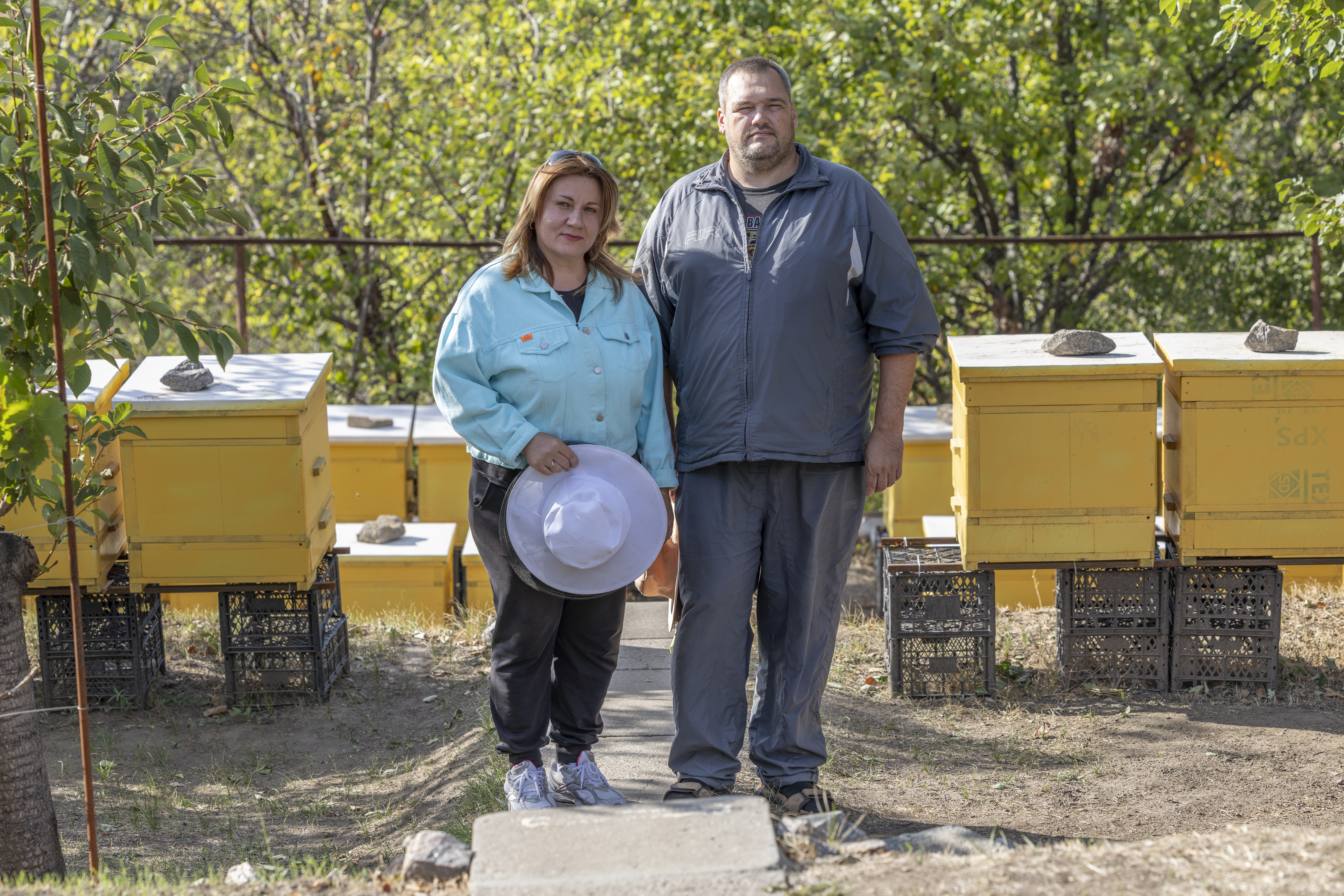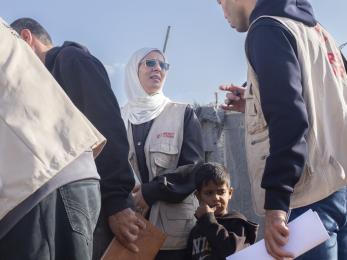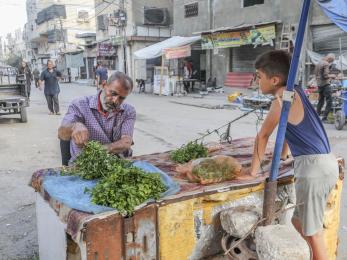Out of tragedy, a new family forms
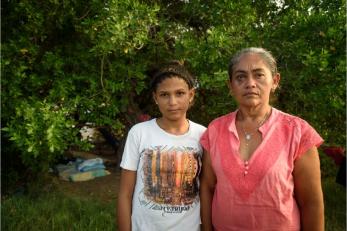
Even in the shade, the heat is stifling. It wraps 43-year-old Oriana like a heavy blanket, adding to the weight of her circumstances. Her 15-year-old daughter, Joelbi, lies in a make-do hammock nearby; a group of other young boys and girls — all unrelated, all under 16 — lounge on the ground and trees around her.
One of the boys points to Oriana. That is everyone’s mom, he says.
Perched on a low-slung tree branch that weaves through the encampment, Oriana wipes away a tear. The gray waters of Colombia’s Rio Ranchera drift along in front of the makeshift family’s camp, a small patch of riverbank dotted with rubbish, fire pits and tattered foam mattresses underneath a bridge on the outskirts of Riohacha, Colombia, some 50 miles from the Venezuela border.
With warmth but great sadness, she gestures to the bridge and the trash and the parentless Venezuelan kids who’ve found safety with her. None of this was part of the plan.
Societal breakdown in Venezuela
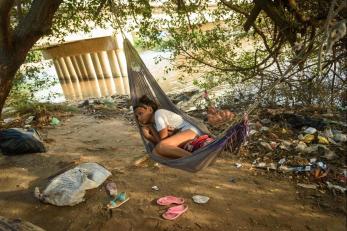
It wasn’t long ago that Oriana had a steady job at a hospital in Venezuela, her home country. She had a house and was able to support her two children, Joelbi and her 16-year-old son, Yohan.
“I loved my job,” Oriana says. “I was comfortable. I felt comfortable.”
But over the past several years, crises including hyperinflation, political dysfunction, disintegration of basic services and rampant crime have been driving Venezuela toward complete economic, social and political collapse. And Oriana and millions more of its citizens have tumbled toward powerlessness in tandem.
“There’s no food [in Venezuela],” Oriana says. “There’s no help. There are so few schools [and] opportunities to study. There are no opportunities.”
With inflation reportedly at more than 40,000 percent, salaries and savings have become nearly worthless and businesses have shuttered their doors one after the other. The hospital Oriana worked at recently closed, too. It couldn’t afford to stay open.
The crisis in Venezuela has plunged almost 90 percent of the population into poverty, and food, medicine, basic supplies and healthcare are either nonexistent or too expensive for families to purchase.
“You cannot live there anymore,” says Luis, another Venezuelan who, like Oriana, has fled to Colombia. “Here we survive, but back in Venezuela we won’t be able to survive.”
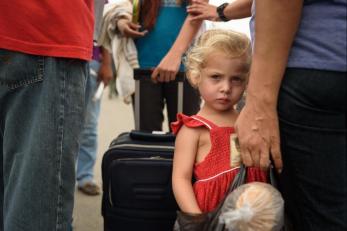
Desperation to earn income, escape increasing violence and — most critically — eat, has sparked a wave of displacement from Venezuela to neighboring countries over the past two years, with the largest number of people — over 800,000 — fleeing to Colombia.
The routes are rife with theft, assault and gender-based violence, but for people with so few choices, facing these risks is often the best one.
“[The day I left] there was nothing at home and my little daughter was very hungry,” says Maria*, a 23-year-old Venezuelan mother who arrived in Colombia just over a month ago. “She was crying, and [so was] my nephew. I didn’t have anything to give them. I didn’t have any money. … It just broke me.”
From her camp on the bank of the Rio Ranchera, Oriana recalls a similar heartbreak.
“I came [to Colombia] because I didn’t have a way to feed my family,” she says, her voice cracking. The pressure of trying to provide for her children as the systems she relied on — her job, access to healthcare, markets with food on the shelves — crumbled around her was too much.
“I had a heart attack [and] I had no way to get medicine,” she cries. Then she became physically paralyzed by stress. “That was my breaking point and I decided to come here.”
But the situation in Colombia is not what she envisioned. “It is not what I was expecting,” she explains. “I thought I was going to find job opportunities. I haven’t.”
The challenges of living in Colombia
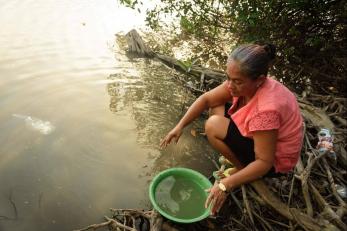
Colombia is coping with its own set of challenges: decades of armed conflict, millions internally displaced, and scarce jobs, shelter and resources that aren’t enough to support its citizens let alone a mass migration of in-need refugees.
Venezuelans crossing into Colombia, then, face a daily struggle to survive not unlike the one they left behind. Most, like Oriana, arrive very poor and with little more than the clothes they are wearing — if they have not already been robbed.
The stiff competition for livelihoods and inability to work legally force them to take informal jobs for low wages, or beg until they have enough money to buy and resell small items like candy or coffee on the street.
Those who are able to earn enough rent hammocks in private yards or spaces on the floor of people’s homes. But the majority, like Oriana, sleep outdoors in public spaces like parks or beaches — a last resort in a situation where there are no good choices.
Out of tragedy, a new family forms
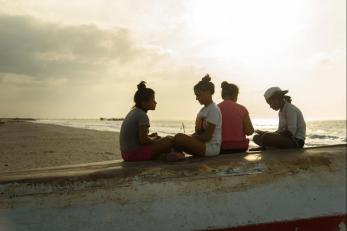
Having nowhere else to go, Oriana and her two children took refuge in a city park when they first arrived in Colombia. It’s in these conditions that she became the matriarch of a much larger family — 12 unaccompanied youth who met in the park after fleeing the same emergency Oriana and her family did.
Already a compassionate and determined mother, Orianna naturally became someone the kids could talk to and feel protected by. And though she is uncertain how she will provide for her biological children in Colombia’s challenging environment, she has taken the others under her care, too.
When the park became too crowded, the family moved underneath the bridge together. To survive, they canvass the city collecting recyclables to sell at a local recycling plant, bringing in around $5 on a good day, just enough to buy rice.
Oriana serves as a mother figure through it all, counseling each of the kids, listening to their concerns and organizing their work to ensure there is enough to eat.
Back under the bridge, Oriana surveys the camp with duty and worry. The rainy season, which will completely flood the riverbank, is starting soon. And in the face of an uncertain future, she has 12 additional children to look out for.
It’s not a role she sought — it’s a role that sought her. Even in this spiraling crisis, there is one thing Oriana can still do: fight for the people who need her.
“[What I need most] is a roof for us all and a good job,” Oriana says. “We don’t have shelter. We don’t have anywhere to go.”
Mercy Corps has worked in Colombia since 2005 helping people affected by conflict get the resources they need to rebuild their lives and lift themselves out of poverty. Now, we are also responding to the urgent needs of Venezuelans who have fled to the country and — like Oriana, her children and the youth she cares for — are fighting for their futures.
*Name has been changed to protect identity and safety.
